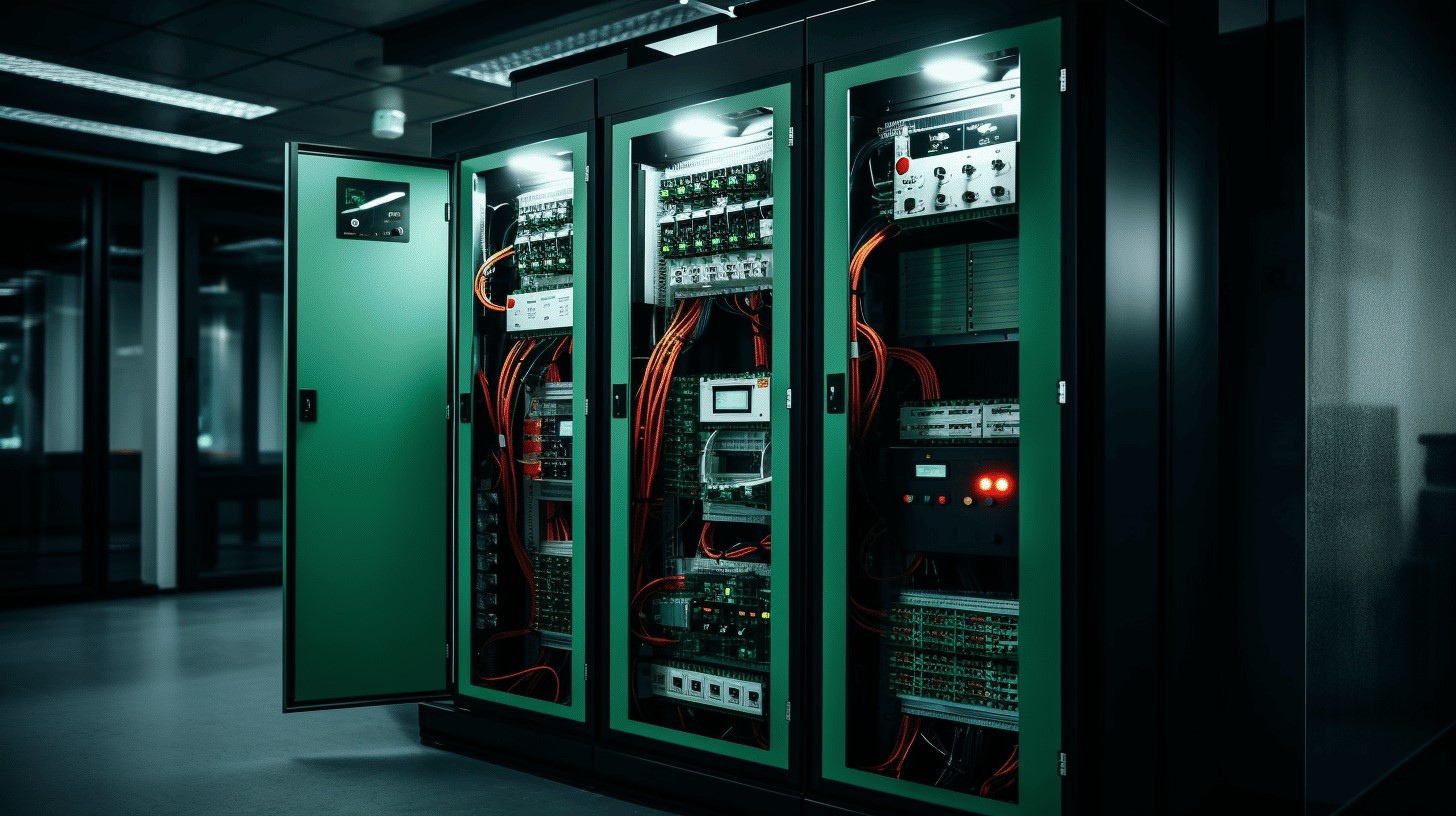Powering Safety: UPS as the Lifeline in Emergencies
Imagine a world where power failures are a thing of the past and where businesses and critical industries are free of the crippling fear of unexpected electricity outages. That utopia is faintly visible on the horizon, but until we reach it, we have a reliable companion at our side - Uninterruptible Power Supply (UPS). This marvel of modern technology plays a pivotal role in ensuring continuity and stability in crucial areas, such as life safety systems. With its unique capability to maintain power during outages and protect vulnerable equipment from electricity spikes, UPS has quietly become the indispensable guardian of business productivity and public safety. This article aims to shed light on the vital role UPS plays in life safety systems while highlighting the benefits it brings to the table.
Benefits of Uninterruptible Power Supply (UPS)
Power outages can happen without notice, and whether brought about by severe weather, unforeseen equipment breakdown, or a stumble in the power grid, the sudden loss of power can disrupt daily operations in the blink of an eye. That is when an Uninterruptible Power Supply (UPS) saves the day. A UPS system offers many benefits, from keeping vital safety measures functioning to illuminating the premises during such irregular incidents.
Importance of Secondary Power Supplies
One of the main advantages of having a UPS is that it serves as a secondary power supply. You might ask, why is that significant? The recent changes to BS 9251:2021 provide the answer. As per this regulation, secondary power supplies for fire safety systems have become mandatory in the UK. In case of a power outage, a UPS battery backup ensures that the fire safety systems stay functional, which can potentially save lives. Secure Power, a leading service provider, offers efficient power backups to meet these regulatory requirements and ensures the smooth operation of fire suppression systems across facilities in the UK.
Supporting Fire Suppression Systems
When it comes to fire suppression systems, a simple sprinkler system might come to mind first. These systems play an essential part in enervating flames and preventing fire spread. But one aspect often overlooked is that these systems also demand power to operate with full efficiency. Hence, in scenarios where a fire causes a power outage, a UPS backup power system becomes indispensable. By delivering continuous power supply, UPS systems ensure that sprinkler systems remain operational in critical moments by preventing potential catastrophes.
Ensuring Illumination in Power Loss
Imagine an unforeseen power loss in a commercial building or a public place. The immediate threat would be the darkness that follows. Here again, a UPS system finds its importance. As per BS EN 50171:2021, central safety power supply systems serve as an independent energy supply to essential safety equipment, and a UPS system falls right under this category. During power outages, a UPS system powers the emergency lighting, allowing individuals to safely navigate in situations where the general lighting fails. The reliability offered by such power backups mitigates panic and confusion, making evacuation processes smoother and faster.
The assurance of a UPS system can indeed be a lifesaver. Implementing UPS-backed power supplies reduces disruptions and adds an extra layer of safety to all sectors, including healthcare, financial institutes, data centres and offices, thereby aiding in creating more resilient infrastructures. A well-designed UPS system effectively supplements primary power sources and significantly contributes to maintaining safety, productivity and overall operational continuity even during unexpected power interruptions.

Use of UPS in Life Safety Systems
Uninterruptible Power Supply (UPS) systems have become an integral part of life safety measures worldwide. These power systems provide a safety net when there is a disruption in the main power supply. They kick into action immediately, offering a continuous source of power, and keeping vital systems operational and people safe. Let's delve deeper into the role of UPS in various life safety systems.
Fire Alarm Systems
Imagine a scenario where a fire breaks out in a building, and the power is lost. The fire alarm system, a critical component of the life safety equipment, fails, unable to alert occupants about the predicament. That could have severe repercussions, emphasising the importance of having a UPS backup.
Fire alarm systems detect smoke and fire quickly. They alert the occupants of the building, giving them ample time to evacuate and simultaneously inform the fire department. The crucial role that fire alarm systems play in safety cannot be overemphasised. Hence, having reliable UPS systems for these is essential to ensure no power disruption compromises their operation. The power provided by the UPS enables the fire alarm systems to work optimally, notifying everyone before the situation gets out of hand.
Backup Power for Lifts
In multi-story buildings or skyscrapers, lifts are not just a means of convenience; they also play a vital role during emergencies. During a power outage or a blackout, the lifts become immobile, becoming a blockade rather than serving their intended purpose.
A UPS system ensures a steady power supply even during mains power failure. This uninterrupted power helps the lifts to continue functioning smoothly, allowing individuals to evacuate quickly and safely during emergencies. In addition, it empowers those with physical disabilities who rely mainly on these lifts.
Emergency Lighting
Imagine being in an unfamiliar building during a power outage. The entire building plunges into darkness, creating panic and chaos, making evacuation challenging. That is where emergency lighting steps in.
The emergency lighting system, powered by the UPS, provides the illumination needed to facilitate safe evacuation. They light up exit paths and stairwells, guiding individuals to safety. The critical role that emergency lighting plays during emergencies highlights the importance of the UPS systems.
Life safety systems heavily depend on the reliability of the power source to perform their crucial function. UPS systems ensure these systems remain operational, protecting life and property. It convincingly argues that having a robust UPS system as backup power for life safety measures is not just an option. It's an absolute necessity for our modern, high-rise world.
Importance of UPS Systems in Data Protection
In the digital age, secure information management is the heartbeat of any business. One often overlooked yet vital component in safeguarding key data assets is the Uninterruptible Power Supply (UPS). A fully functioning UPS is not just about powering your systems; it plays an essential role in data protection. Herein, we will discuss the importance of UPS in data protection.
A UPS system is like an insurance policy – you might not think you need it until the unexpected happens. An unforeseen outage or power surge can result in cataclysmic data loss. According to a study on business data, a single minute of downtime can cost a company thousands of pounds. This rate can multiply depending on the type of industry.
To understand the true impact of a UPS, consider these three crucial factors:
- Avoids Data Loss: Firstly, imagine working on an important project when suddenly the power cuts out. An immediate power loss can leave the project uncompleted and essential data missing or corrupted. UPS systems can deliver instantaneous power to allow the system enough time to save any open files and shut down correctly.
- Prevents Downtime: Secondly, the resulting issue following an unexpected outage is downtime, which can detrimentally affect company productivity and operations. UPS systems seamlessly kick in during power failures, preventing any halts in productivity.
- Potential Safety Measures: Lastly, and more critically, in certain sectors such as healthcare or heavy industry, power interruptions can lead to dangers in equipment failure, compromising staff and client safety. UPS systems offer a layer of protection by supplying constant power.
Good records management, supported by reliable UPS systems, forms the backbone of effective data governance and data protection strategies. By ensuring clean, uninterrupted power, UPS systems underpin the continuity and integrity of data operations.
Hence, investing in UPS systems is more than just ensuring power supply; it's an investment in data safety, business continuity, and overall operational integrity. Forging a robust structure for data defence, UPS systems sit at the crossroads between power supply and data protection, making them an essential asset in any business operation.
Role of Surge Protection in System Protection
When safeguarding our electronics, it's hard to underestimate the value of surge protection. Often overlooked yet vital, these indispensable devices act like stalwart sentinels, keeping our delicate electronic systems shielded from unexpected and often destructive power surges and spikes. Their primary function is to absorb surplus electrical energy, thus preventing it from wreaking havoc on our devices.
Guarding Against Power Surges and Spikes
Power surges or spikes occur when there's an unexpected increase in voltage that significantly exceeds the designated level. Essentially, any voltage above the domestic standard can potentially be harmful. However, surge protection stands guard and protects against these invisible threats.
In the face of such power fluctuations, it is surge protection that takes a hit. Acting as a shield, it protects electronic systems and devices from the devastating effects of power surges and electricity spikes. It diverts the excess electricity caused by the surge into the grounding wire, thus protecting your electronic devices from damage or destruction. Surge protection works by employing metal oxide varistors (MOVs), which dissipate the overwhelming electrical energy as heat, sparing your devices from an untimely death.
Surge protection is invaluable in preventing:
- Data loss caused by power surges in computer systems.
- Component degradation or failure, thereby prolonging the life span of your gadgets.
- Short circuits which could result in fires.
"Surge protection guards your electronics like an unseen superhero. Its stout defence is what stands between your digital devices and catastrophic damage."
Evidently, incorporating surge protection into our electronic systems is a small investment when compared to the potential cost of replacing expensive equipment. No matter how robust or advanced your electronic device might be, it is still vulnerable to the raw power of electricity. Therefore, for the unwavering protection of your electronic devices and systems, surge protectors are an indispensable aspect of any tech-prepared setup. Remember, being proactive about protection could save you a lot on repairs later!
Importance of Fire Safety in UPS Systems and Building Design
Ensuring fire safety is intrinsic in the successful implementation of Uninterrupted Power Supply (UPS) systems and in the design of secure buildings. In a world where technological advancements unravel at an unprecedented scale, the importance of fire safety provisions in UPS systems, specifically for their battery components, has never been more critical. This significance is also echoed in building design strategies where fire safety measures provide occupants with an extra layer of protection against unforeseen circumstances.
Fire Protection Standards for UPS Systems
Stationary backup systems like UPS undoubtedly play a pivotal role in power continuity within our homes, businesses and industries. However, due to the potential risks associated with their operation, strict adherence to fire protection standards cannot be overstated.
One of these risks pertains to thermal runaway—an uncontrollable increase in temperature—which can occur in battery cells and potentially lead to a fire. To mitigate such risks, it is necessary to abide by certain safety standards:
- Batteries should have a sufficient cooling system to prevent overheating.
- In addition to cooling systems, batteries should have built-in safety features that reduce the possibility of thermal runaway.
- Smoke detection systems are integral to discerning early signs of potential fire hazards, allowing for immediate action.
Besides these measures, fire protection standards also recommend installing fire barriers and cabinets to contain potential fires and prevent them from spreading to other parts of the building.
"Smoke detection systems and fire protection standards are crucial for battery use in stationary applications like UPS systems."
Incorporating Fire Safety in Building Design
Incorporating fire safety into the building design process is a fundamental aspect of a structure's overall safety. It is much more advantageous to incorporate these safety measures during the design phase than to deal with potential issues once the building is already operational.
Key fire safety features to consider include:
- Installing fire-resistant materials: This can significantly slow down the spread of fire, providing occupants more time for evacuation.
- Adequate evacuation routes and fire exits: They should be well-spaced and clearly marked to facilitate a swift and safe evacuation during an emergency.
- Fire detection and suppression systems: These include smoke detectors, sprinkler systems, and fire extinguishers in key areas of the building.
Designing a building with these factors in mind does more than just meet safety regulations; it shows a proactive commitment to the safety and well-being of the building occupants.
"Incorporating fire safety into the building design process is crucial for the overall safety of a building."
Both UPS system batteries and building design need to be approached with safety at the forefront. By acknowledging the importance of fire safety in these sectors, we ensure not only the smooth running of systems and operations but also the well-being of those utilising such spaces.
Investigations and Importance of Backup Power for Industries
In an advancing world, the unending push for industry-wide efficiency has never been more pressing. One overlooked aspect that contributes significantly to this mission is Uninterrupted Power Supplies (UPS).
The Health and Safety Executive, widely known as HSE, has taken it upon themselves to delve deeper into the functioning of industries with particular emphasis on their power systems. During their investigations, they've unearthed a worrying trend - the failure of industrial UPS systems - that has led to several dangerous occurrences in the UK. This unfavourable finding has magnified the importance of backup power in industry functioning, placing it right in the heart of continued industrial progress and efficiency.
HSE Investigations and Industrial UPS Systems
In an industrial setting, the importance of a continuous power supply cannot be overstated. It's essentially the lifeblood of operations, without which there'd be a grinding halt affecting productivity and causing losses. This necessitates the existence of a reliable backup in place, ensuring the continuity of operations even when the primary power source falters.
The HSE turned its investigative gaze towards industrial UPS systems, following several dangerous occurrences linked to their failure. While UPS systems are designed to be fail-safe, the reality on the ground is quite contrary.
Look into a couple of vital concerns raised in these investigations:
- Inadequate Maintenance: One prime reason behind the failing UPS systems was found to be poor maintenance levels. Quite a number of industries were not giving these systems the importance they deserved which led to avoidable failures.
- Insufficient Backup Power: Another implication of the investigations points to a preparedness shortcoming. Many industries were not equipped with an adequate backup power supply in place.
"Uninterrupted power supplies are the catalysts of normal operations and a shield against significant mishaps. It's astonishing how their upkeep is often sidelined, greatly undermining safety and efficiency," the HSE report noted. The body thus seeks to ensure that industries view the maintenance of these systems with the seriousness it deserves, to nix any potential catastrophe.
Despite these investigations highlighting substantial gaps, they also present a critical lesson for industries - the essence of a foolproof backup power ecosystem. With proper maintenance, an adequate backup power supply, and consistent checks on UPS systems, industries can avoid pitfalls that may otherwise disrupt their operations or cause dangerous occurrences.
The investigations' findings underscore that the route to efficiency isn't merely centred around hardworking personnel or sophisticated machinery. Rather, a crucial factor that needs to be in the mix is a reliable Uninterrupted Power Supply system, a significant reason why industries need to pay more attention to their backup power infrastructure and maintenance.
Importance of Backup Power for Telecoms
In the age of digital connectivity, telecommunication companies stand at the forefront—forging an integrated world where consumers thrive on speed, efficiency, and dependability. Telecommunication, hence, is no longer a luxury, but a daily necessity powered by an intricate web of infrastructure and technology.
One vital component of this mix that often goes unnoticed is backup power systems, particularly Uninterruptible Power Supply (UPS) systems. To put it briefly, UPS is the invisible hero ensuring that the world, or at least your world, doesn't come to a standstill in a power outage scenario. This section explores the importance of backup power in the realm of telecoms, diving deeper into its role, benefits, and necessity.
Why Backup Power Is Non-Negotiable for Telecoms
There are three main reasons why telecoms must incorporate backup power into their infrastructure:
- Continuity of Service: The telecom industry shapes its reputation on the ability to provide uninterrupted connectivity, whether it's a rural broadband network or an urban 5G experience. A singular power outage can spell disaster for a telecom's dependability quotient, leading to a significant dent in customer trust, not to mention monetary losses.
- Protection of Equipment: Telecom equipment is an intricate and costly investment. These systems are susceptible to abrupt power cut-offs that can damage systems and, at times, lead to irreversible loss.
- Regulatory Compliance: A good number of regions mandate telecom companies to have a backup power plan in place. Such regulations are a testament to how critically vital it is to uphold a constant power supply in telecom services.
Positioning UPS in the Forefront
Installing UPS systems as part of backup power plans offers an array of advantages:
- UPS offers an instantaneous power switch: Unlike other backup power options, UPS supplies power instantaneously, with no delay between main power failure and backup power supply.
- It provides power conditioning: Besides backup, UPS also conditions the power supply, thereby curtailing power surges and spikes that could disrupt operations and damage equipment.
- Excellent for short-term power cuts: Most power outages last only a few seconds to a couple of minutes. UPS is perfect for such short-term power failures.
From maintaining impeccable service standards to safeguarding precious equipment and adhering to regulatory norms, backup power through UPS systems has established itself as a non-negotiable facet of modern telecommunication. As the telecom industry continues to advance and expand, the need for rock-solid backup power solutions will only grow exponentially.
Conclusion
Having a dedicated Uninterruptible Power Supply (UPS) in place serves as a cornerstone for a reliable power protection strategy in various areas of life, from safety systems to telecommunications. At Secure Power, we recognise the urgency of these systems, and we're committed to providing practical, tailored solutions that underscore our dedication to ensuring your operations remain uninterrupted, even in the face of power outages.
Our team delivers robust, reliable power protection systems, robust UPS batteries for data protection, and comprehensive support towards preventative UPS maintenance that are paramount to any business continuity plan. We ensure your business thrives, regardless of little hitches the UK power grid might throw your way.
Let us join you in your quest for robust power solutions, trusted safety systems, and business growth. With Secure Power, say goodbye to power disruptions, and hello to unrivalled business continuity. Discover how we can secure your business today by contacting us today.
Frequently Asked Questions
-
What is an Uninterruptible Power Supply (UPS) and how does it work?
An Uninterruptible Power Supply (UPS) is a device that provides emergency power to critical electrical systems in the event of a power outage or voltage fluctuation. It works by continuously monitoring the input power and instantly switching to battery power when a disruption is detected, ensuring uninterrupted operation.
-
Why are UPS systems important for life safety systems?
UPS systems are crucial for life safety systems in the UK as they provide backup power to essential equipment such as fire alarm systems, emergency lighting, security systems, and elevators. This ensures that these systems remain operational during power outages, allowing for timely evacuation, fire suppression, and overall safety.
-
What are the different types of UPS systems available?
There are three main types of UPS systems: 1. Offline/Standby UPS - provides basic protection with a small delay during power disruption, 2. Line Interactive UPS - offers additional voltage regulation and protection against power sags and swells, and 3. Online/Double Conversion UPS - provides the highest level of protection with zero transfer time and isolates connected equipment from power irregularities.
-
How long can a UPS system provide power during an outage?
The backup power duration of a UPS system depends on factors, such as battery capacity, load, and efficiency. Generally, UPS systems are designed to provide power for a few minutes to an hour, giving enough time for essential systems to safely shut down or for alternate power sources to take over.
-
What should I consider when choosing a UPS system for life safety systems?
When selecting a UPS system for life safety systems in the UK, factors like capacity, runtime, maintenance requirements, scalability, and compliance with local safety regulations should be considered. It is advisable to consult with a professional to assess the specific power needs and design the most suitable UPS solution.














